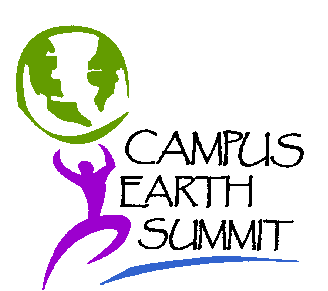
The first Campus Earth Summit was held At Yale University on February 18 - 20, 1994. The conference brought over 500 students, faculty members and administrators from 120 American universities and 29 international universities. The purpose of the summit was to engage in discussion, share information and brainstorm on how to redesign environmental education and campus environmental practices for a sustainable twenty first century. The outcome of the summit was the development of the Campus Blueprint for a Sustainable Future.
This page like the Campus Blueprint for a Sustainable Future is designed to be a growing resource on the Internet for Campus Environmental Information and Issues. It is very much "under construction" as delegates from across the country slowly begin to place valuable research material, environmental audits, campus policies and practices on-line. Since there is no fixed site for all of this information at the moment, the hope is that different institutions will volunteer to create and maintain Home Pages on the different aspects of campus environmentalism that were covered in the Earth Summit. This Home Page would serve as the doorway to others with a more specific focus. We are looking for schools interested in volunteering your campus as a host site.
Participants at the summit broke into three major topic areas:
In each of these areas, environmental organizers and advocates from around the country began the discussions in a panel format, identifying important topic areas. Then participants broke up into separate strategy groups designed to examine and develop recommendations for a variety of target areas. These individual group recommendations were then coalesced into the Campus Blueprint for a Sustainable Future detailed below.
Introduction
Summary of Recommendations
Remarks by Vice President Al Gore
Preface by Teresa Heinz
How to Put the Blueprint into Practice
How the Blueprint Is Organized
Recommendations
1. Integrate Environmental Knowledge into All Relevant Disciplines
2. Improve Undergraduate Environmental Studies Course Offerings
3. Provide Opportunities for Students to Study Campus and Local Environmental Issues
4. Conduct a Campus Environmental Audit
5. Institute an Environmentally Responsible Purchasing Policy
6. Reduce Campus Waste
7. Maximize Campus Energy Efficiency
8. Make Environmental Sustainability a Top Priority in Campus Land-Use, Transportation, and Building Planning
9. Establish a Student Environmental Center
10. Support Students who Seek Environmentally Responsible Careers
Strategies for Implementation
Bibliography
Acknowledgments
How to Order the Blueprint
There are a number of excellent environmental resources available on the Internet. One of your best sources for finding this information is A Guide to Environmental Resources on the Internet by Carol Briggs-Erickson and Toni Murphy. It is available through the Web as a hypermedia document or through Gopher. Please note that this in a long text document. The entire document may not be able to be read by some clients. In that case, download the entire file and open it up in any editor or word processor.
Green School List hosted by Brown University - This listserv focuses on improving campus environmental practices in such areas as recycling, waste reduction, energy conservation, and procurement. To subscribe, send an email message to the following address: LISTSERV@BROWNVM.BROWN.EDU. The body of the message should say: SUBSCRIBE GRNSCH-L your name. The Brown Is Green (BIG) Home Page describes Brown's initiative to promote campus environmental responsibility and provides links to other campus environmental resources. For more information on the GRNSCH-L Listserv or BIG program, contact
Environmental Studies List hosted by Brown University - Environmental studies discussion. This is a moderately active group discussing a variety of environmental issues often relating to education and teaching. To subscribe, send an email message to the following address: LISTSERV@BROWNVM.BROWN.EDU. The body of the message should say: SUBSCRIBE ENVST-L your name.
The Center for Environmental Studies at Brown recently completed a self-study and review of the program.
Recycle List hosted by University of Maryland - This listserv focuses on recycling issues in communities and on campuses. To subscribe, send an email message to the following address: LISTSERV@UMAB.UMD.EDU. The body of the message should say: SUBSCRIBE RECYCLE your name.
SEACNET (Student Environmental Action Coalition) - information under construction
EcoGopher at University of Virginia - Ecogopher provides easy access to information from many environmental agencies and organizations all in one place. Using "katie" (keyword search of all text in EcoGopher). Researchers, environmentalists and teachers can find an abundance of resources. The location is gopher> ecosys.drdr.Virginia.edu
Econet Gopher Services - Econet Gopher/Environment
WATgreen University of Waterloo, Canada homepage which links "Environmental Studies to Campus Practices"
Princeton Environmental Reform Committee (PERC)
Speakers at the Earth Summit included:
Remarks by Vice President Al Gore
To become a host site you must have a computer connected to the Internet which can hold local files. The machine should be a server which is on 24 hours a day. Files must be located in a public access directory that allows anonymous login. Files can be available for simple ftp, from a Web client, or can be accessed through a campus Gopher system. We are looking for schools with World Wide Web servers that can host other home pages. To be a Web host site doesn't mean storing other peoples files on your system but keeping track of where the files are located. For example, if a school agrees to host the Recycling on Campus Home Page, other schools can email them information with URL's (Uniform Resource Locators - the hypertext pointers that allow you to jump to a document on another system) and the host site would continue to update the home page with the new pointers. If you are interested in hosting a home page, please send email to
Listserv - an email hub. Members subscribe to the list. Any email messages which are mailed to the list are automatically distribnuted to all subscribers. This allows people to post questions and distibute information.This page is hosted by PERC, the Princeton Environmental Reform Committee at Princeton University